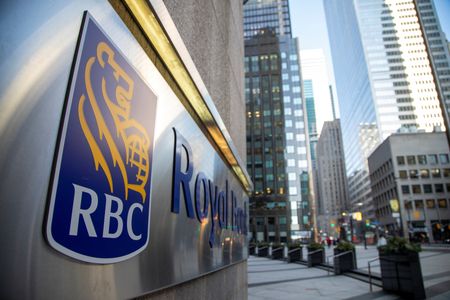By Nivedita Balu and Manya Saini
(Reuters) -Royal Bank of Canada on Wednesday beat analysts’ estimates for quarterly profit, as its wealth management and capital market divisions benefited from higher fee income while elevated interest rates helped the bank earn more from lending.
Still, Canada’s biggest bank set aside more funds to cover bad loans, preparing for households to feel the squeeze from the Bank of Canada raising interest rates rapidly to fight inflation.
Money markets expect interest rates to fall in the second half of the year.
RBC CEO David McKay said the uncertainty around monetary policy points to 2024 being a “transitional year” for markets, also considering the effect of geopolitical tensions.
However, higher rates boosted RBC’s net interest income by 2.1% year-on-year, while the capital markets unit benefited from fixed-income revenue.
National Bank analyst Gabriel Dechaine cited an “improved revenue generation environment.”
Adjusted profit came in at C$4.07 billion, or C$2.85 per share, for the three months ended Jan. 31, above analysts’ expectations of C$2.80 per share, according to LSEG data.
Provisions for credit losses jumped 53% from a year ago to C$813 million.
On Tuesday, RBC’s peers Bank of Montreal and Bank of Nova Scotia said they had built bad loan provisions and warned that growth would be muted until rates begin falling.
RBC shares were up 0.5% in Toronto, while National Bank of Canada rose 3.5% following a profit beat.
READY FOR HSBC CANADA
RBC also flagged a 50% rise in integration costs from its C$13.5 billion purchase of HSBC’s Canada unit, set to close next month.
Analysts have raised questions about the strength of RBC’s balance sheet after the deal closes, after the regulator hiked the minimum requirement to 11.5%.
RBC said it expects its core capital ratio to be about 12.5% after the deal closes, down from 14.9% at the end of January.
Jefferies analyst John Aiken said capital growth in the latest quarter eases concerns around the impact of the purchase.
The bank also announced it was eliminating a discount on its dividend reinvestment program, which could help boost capital.
The regional banking crisis in the U.S. has put some strain on City National Bank – which caters to a Hollywood clientele and was acquired by RBC in 2015 – forcing its parent to inject capital, cut nearly 100 jobs and make management changes.
RBC said City National remains a top priority and it will focus on delivering a more normal level of net income in 2025.
“There is a real opportunity for us to … build this business out and make more money doing it, even with the existing balance sheet,” chief executive McKay said.
He conceded that the company had emphasized “growth over the profitability of the growth a little too strongly.”
RBC’s earnings were dented by a C$159 million fee from the U.S. Federal Deposit Insurance Corporation, which has levied charges on banks to replenish its deposit insurance fund drained by the collapse of Silicon Valley Bank and Signature Bank last year.
(Reporting by Manya Saini in Bengaluru and Nivedita Balu in Toronto; Editing by Arun Koyyur, Tomasz Janowski, Mark Porter and Kevin Liffey)


